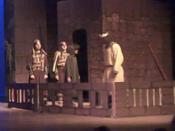"Fair is foul, and foul is fair" (I.i.10). This becomes
the key phrase in describing Macbeth's downfall. It
defines the night vs. day motif, foreshadowing the evil
that will soon come. The night vs. day motif is so
important in bringing out the theme of evil in this play
because almost all of the elements of Macbeth's downfall
are revealed at night. Sleeplessness, murder, and the
witches' prophecies all become relevant as the drama
unfolds.
When the witches tell Macbeth that he will soon be
the Thane of Cawdor, his ambition blossoms. Before long
he realizes that he has to get Duncan out of his way.
He then starts something he is not mentally ready to
start when he kills Duncan. The first glimpse of evil
comes that night. After he has done his deed, the
paranoia sets in. "But wherefore could not I pronounce
'Amen'?" (II.ii.31).
Macbeth realizes that the
"goodness" is starting to drift away. He looks at his
hands and sees his guilt, the blood.
The next example of evil at night is when the
sleeplessness sets in and Macbeth's guilt starts to get
the best of him. He slowly starts going mad because of
his guilt and begins to worry. Macbeth tries to snap
out of it and act normal so that nobody will suspect
anything, but he gets worse. "Methought I heard a voice
cry, 'Sleep no more! Macbeth does murder sleep'"
(II.ii.35-36). Macbeth's sleeplessness means the more
sleep he loses, the more he is exposed to night, which
is evil.
The witches play a key role in turning Macbeth into
the paranoid, dangerous person that he his. They
basically ignite the tragedy as well as Macbeth's fate
when they tell him he will be Thane of Cawdor. Macbeth
was not aware of the problems that the prophecy would
soon create, nor was he aware that it would bring him to
his end.





